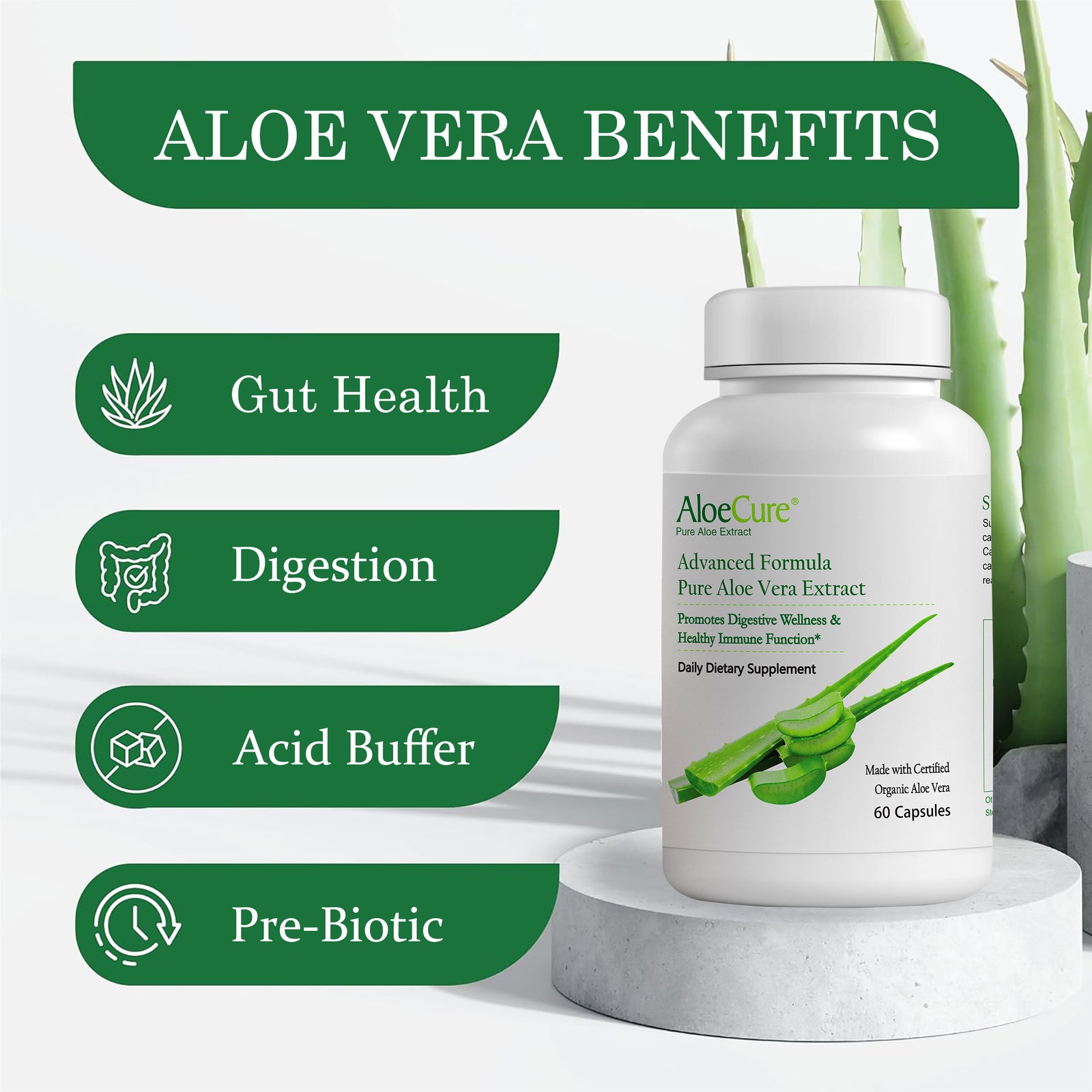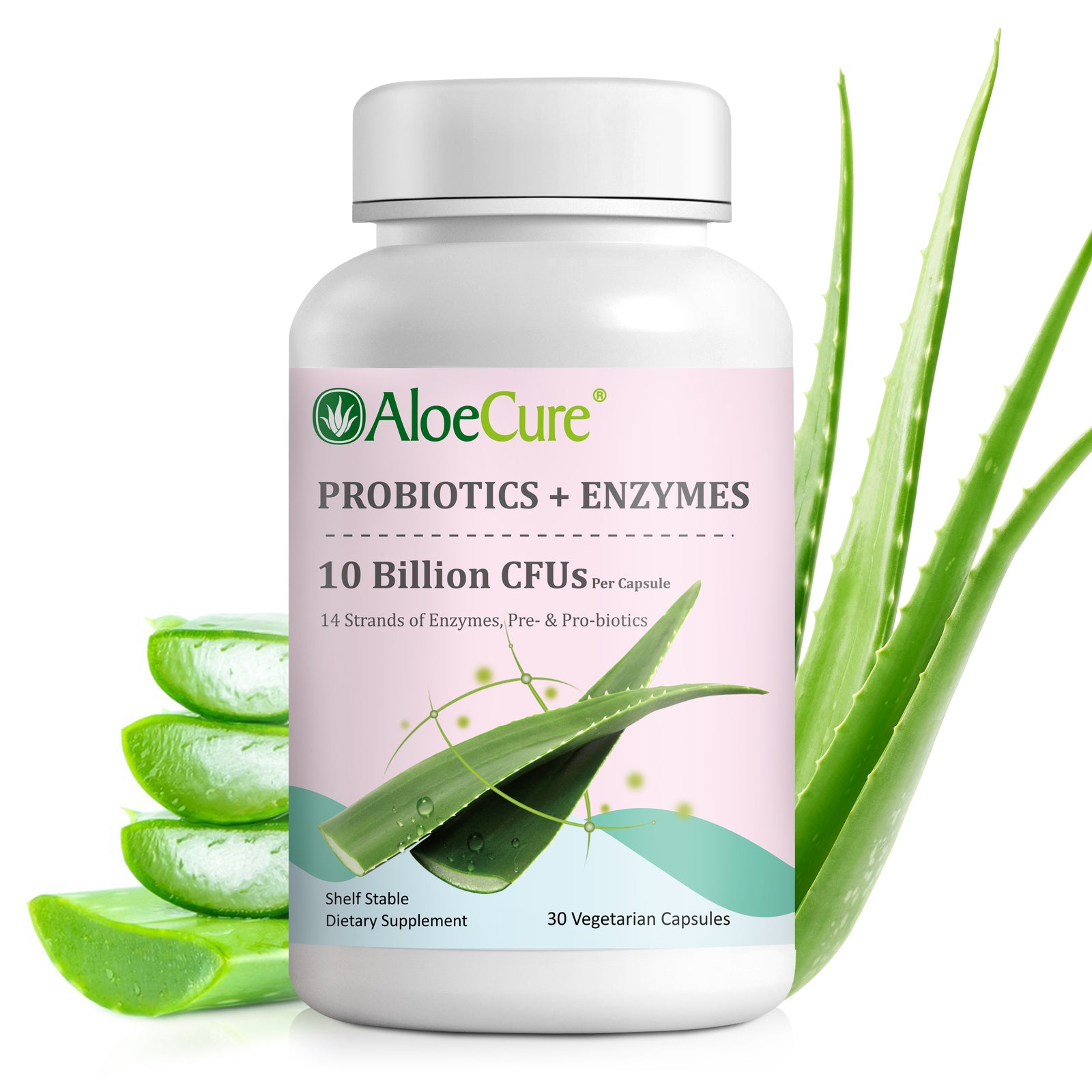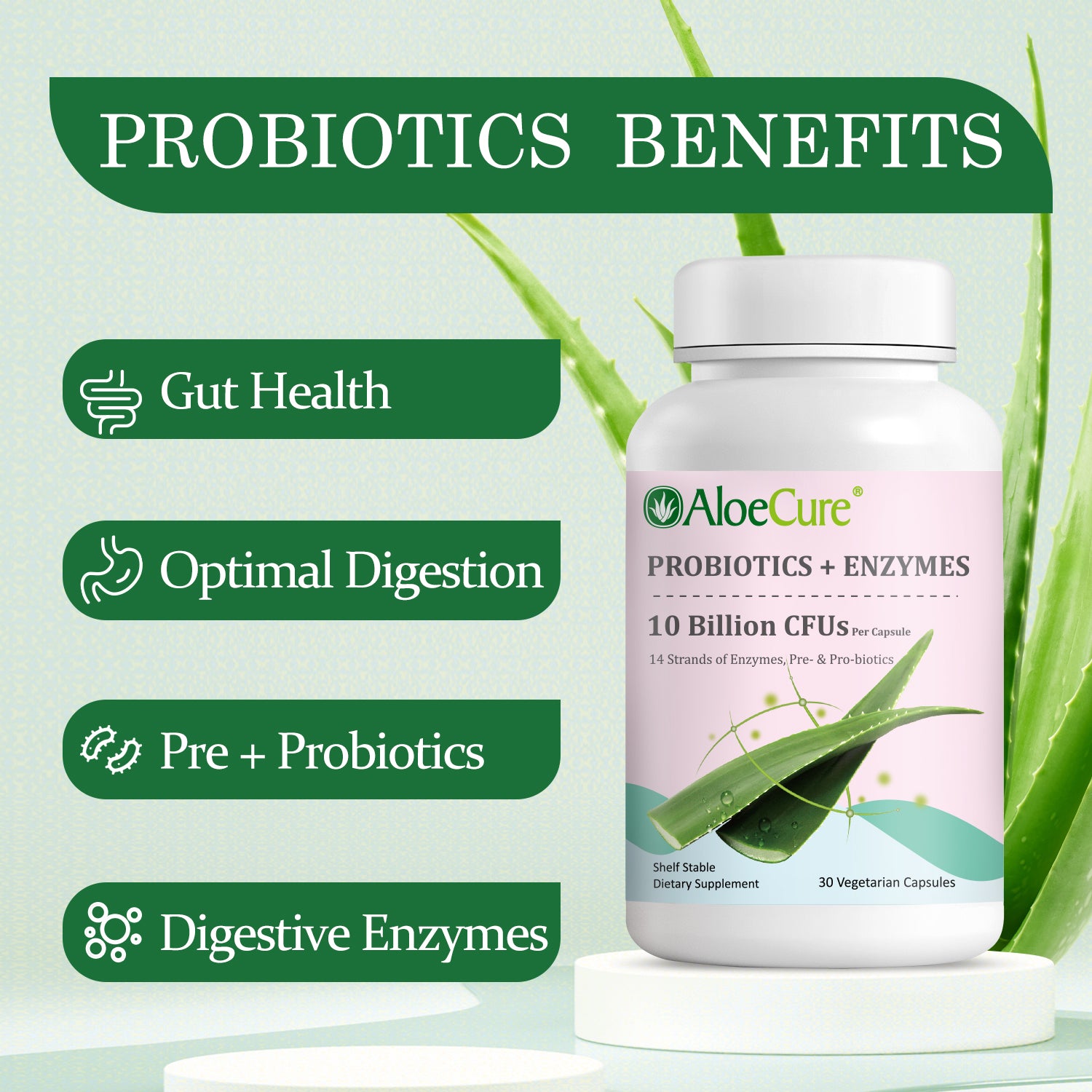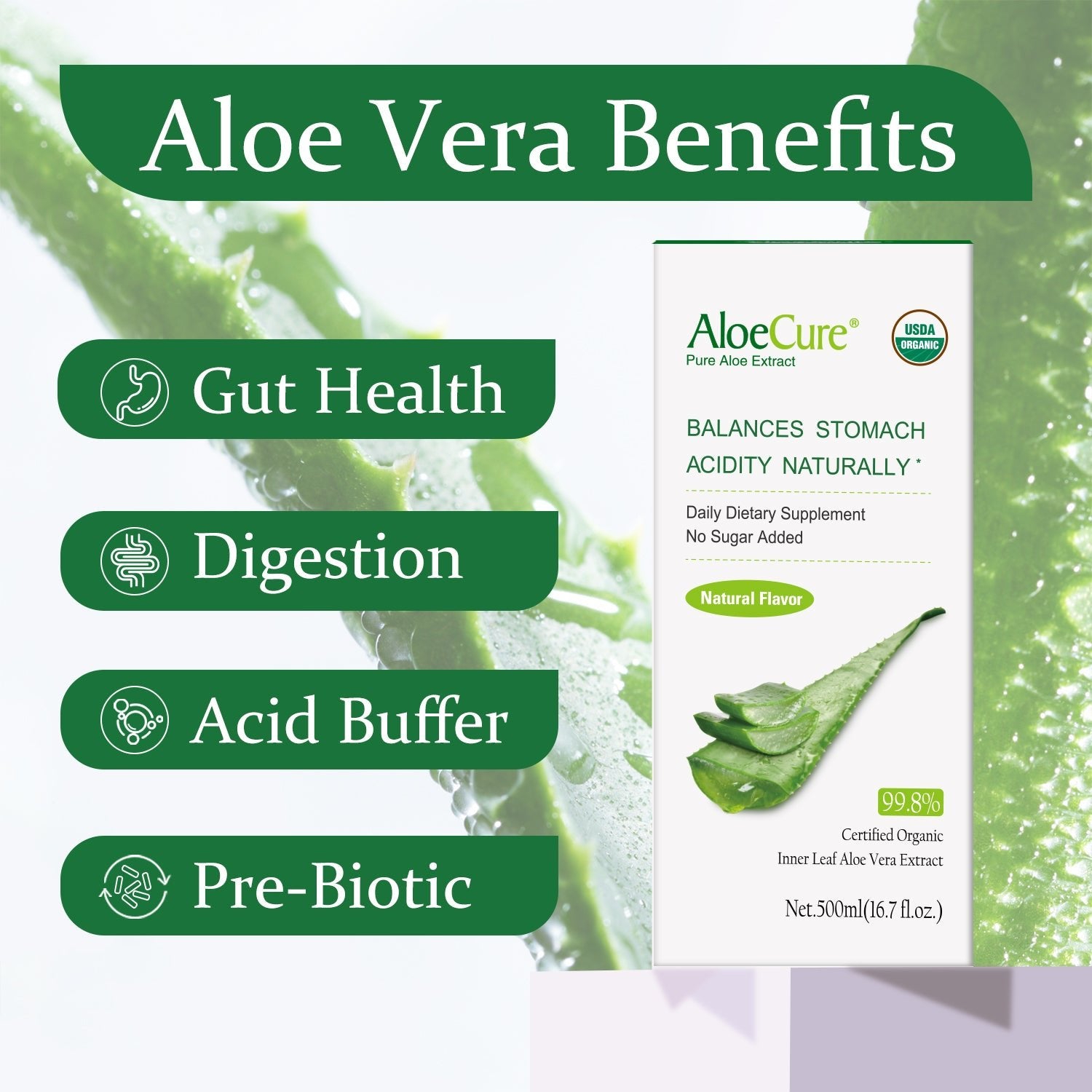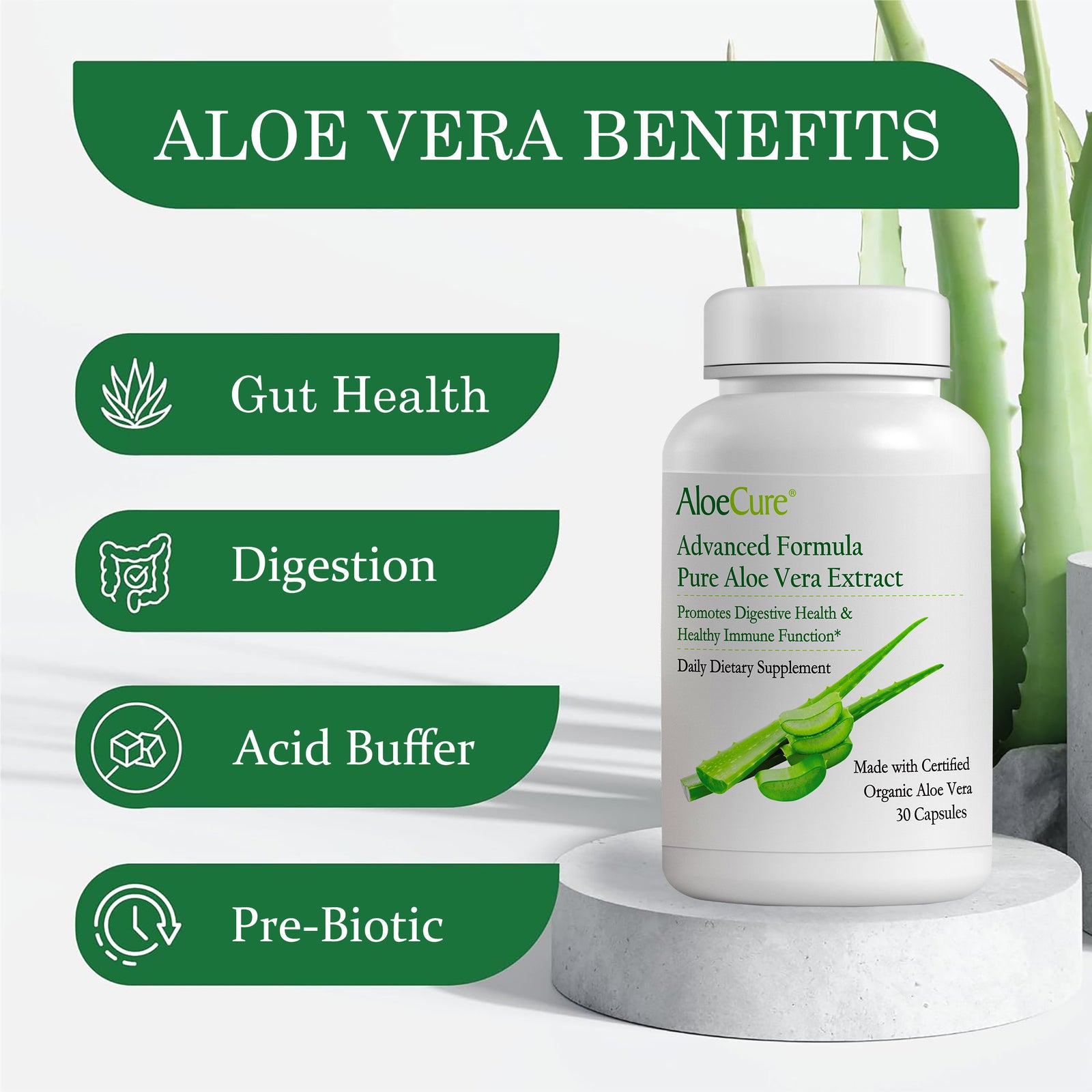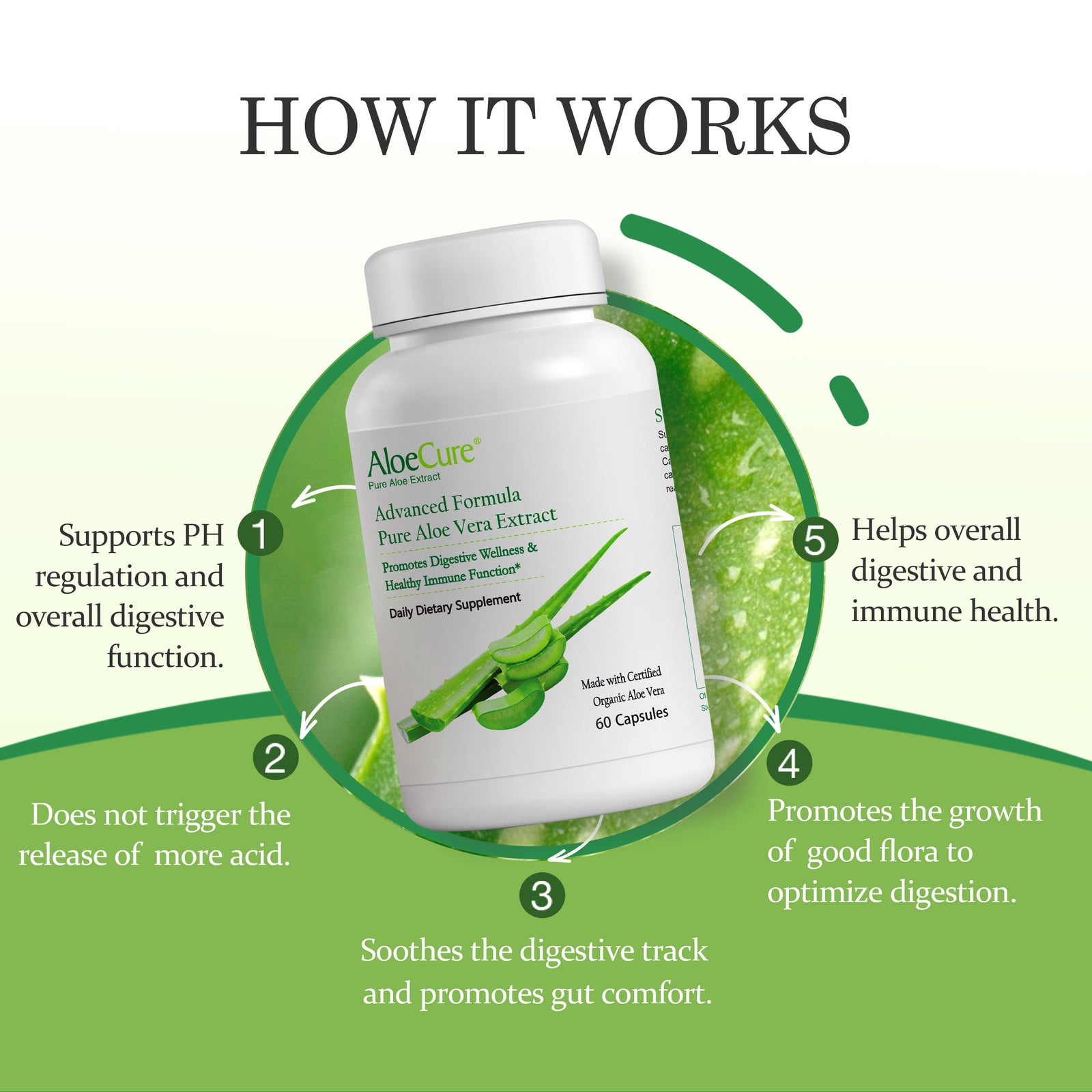Your Cart is Empty
Subscribe & Save 20% on All Products!
Subscribe & Save 20% on All Products!
Subscribe & Save 20% on All Products!
14 min read
When you're on the hunt for the best aloe vera juice for acid reflux support, the most important things to look for are purity, proper processing, and a source you can trust. Anyone seeking natural support for their digestive wellness should look for a high-quality, USDA organic certified inner fillet juice that is completely free from added sugars and aloin.
Trying to navigate the world of natural wellness can feel like a lot, especially when you’re just looking for something to bring a little more comfort and harmony to your digestion. Occasional acid indigestion is something many of us deal with, and it's no surprise that people are turning to plant-based options like aloe vera juice to help maintain a balanced internal environment.
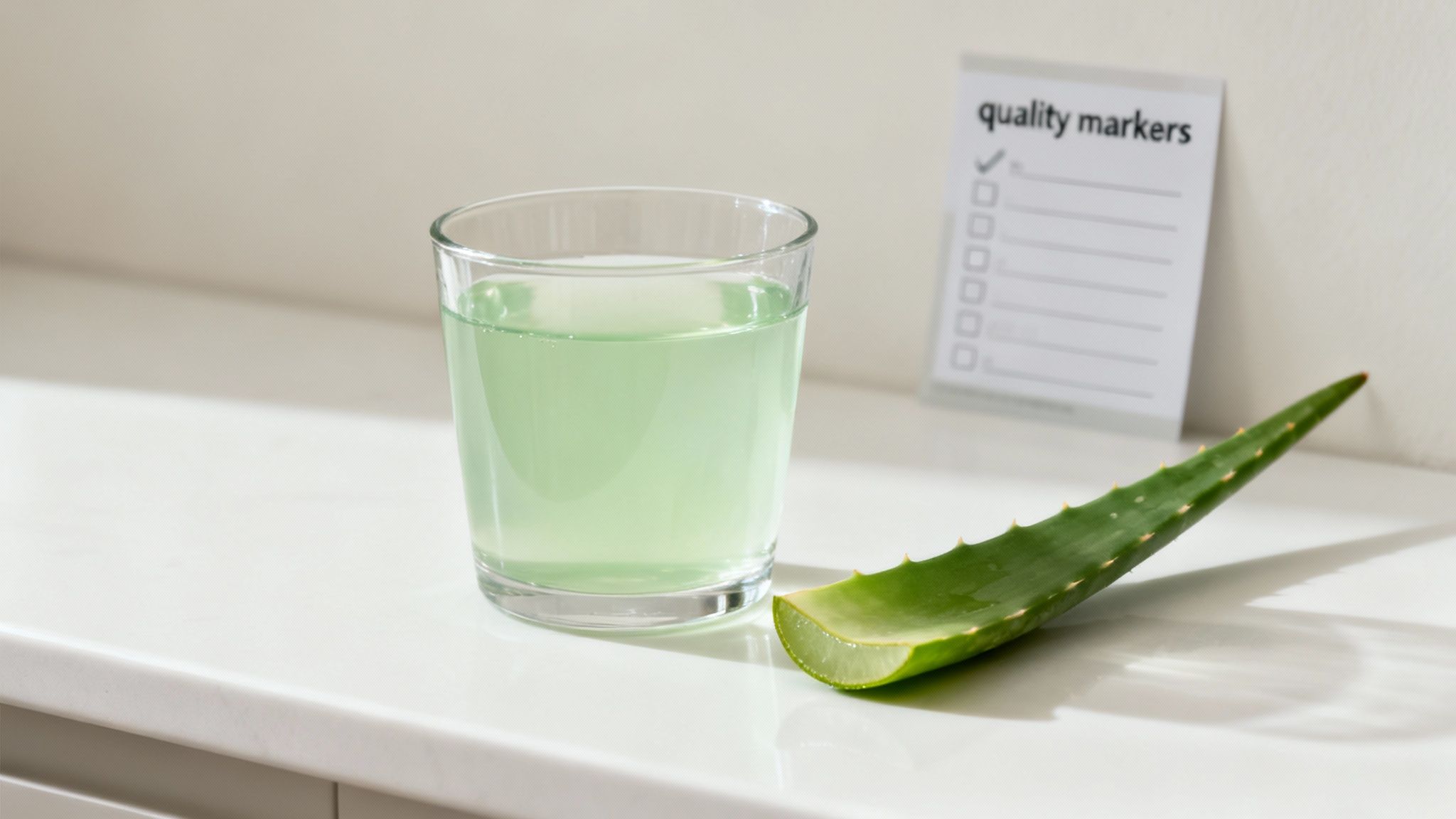
The aloe vera plant is packed with a wealth of natural compounds that are believed to gently soothe the digestive tract. You can think of it as a calming balm for your internal pathways. When digestive discomfort strikes, the goal is to find a feeling of ease, and aloe vera’s inherent properties are perfectly suited for that. This is exactly why it's earned such a lasting reputation as a go-to for supporting overall digestive health.
Here’s the thing: not all aloe vera juices are created equal. The real difference often boils down to how the aloe is farmed, processed, and bottled. This is why we are fully vertically integrated—we grow our own organic aloe, process it ourselves, and produce the final product. Having complete control from farm to bottle simply ensures a higher quality juice.
The growing popularity of aloe vera for digestive support is undeniable. Market trends show a steady increase in U.S. sales as more people seek out natural health products. Many experienced users suggest starting with small servings, like 1/4 to 1/2 cup daily, often taken about 20-30 minutes before a meal to help soothe the esophagus.
Choosing a premium aloe vera juice means you’re getting a product designed to work in harmony with your body’s natural processes, free from unnecessary additives that could detract from its supportive qualities.
To help you make the best choice, it’s useful to know what to look for on a product label. A few key markers can instantly signal whether a juice is designed for maximum purity and effectiveness. Below is a quick checklist of the most important factors.
Use this table as a quick reference to identify the most important factors when selecting an aloe vera juice for your wellness routine.
| Quality Factor | Why It Matters for Your Digestive Wellness |
|---|---|
| USDA Organic Certified | This guarantees the aloe was grown without synthetic pesticides or fertilizers, ensuring a pure, clean start. |
| Inner Fillet Only | It ensures the juice is made from the most nutrient-rich part of the plant and is free of aloin, a natural laxative. |
| No Added Sugar | Added sugars can contribute to digestive imbalance, undermining the very soothing properties you're looking for. |
| Vertically Integrated | A company that controls the entire process, from farm to bottle, can better guarantee the purity, potency, and overall quality of the final product. |
So, how does a simple plant like aloe vera actually support you when you experience occasional digestive discomfort? To really get it, we need to look under the hood—or in this case, inside the leaf. Aloe vera isn't just green goo; it’s a powerhouse of natural compounds that work together to support your digestive system.
The real magic behind aloe’s soothing reputation comes from special long-chain sugars called polysaccharides. Think of them as the plant's main active ingredient. These compounds are known for their ability to create a gentle, protective coating along your internal pathways, including your esophagus and stomach.
When your digestive tract is coated and calm, it just works better. It's this gentle, soothing action that makes polysaccharides the star players in promoting that feeling of digestive harmony.
There's one polysaccharide that gets special attention: Acemannan. This is a key bioactive compound found in the rich, inner gel of the aloe vera leaf. Scientists have really focused on acemannan for its role in supporting the integrity of the gut lining, which is absolutely crucial for a healthy digestive system.
But it’s not just about acemannan. Aloe vera juice is packed with a whole team of beneficial elements that work together.
Vitamins and Minerals: It’s a natural source of antioxidants like vitamins A, C, and E, which help protect your body from the daily grind of oxidative stress.
Amino Acids: These are the essential building blocks for protein, vital for keeping all your body's tissues—including your digestive tract—in good repair.
Enzymes: The natural enzymes found in pure aloe can help your body break down fats and sugars more efficiently, supporting better digestion and nutrient absorption.
When all these components are present and working in sync, they create an environment where your digestive system can feel settled and balanced.
For centuries, people have turned to aloe vera for digestive wellness, and modern science is starting to show us why. It all comes back to the plant's natural soothing properties. This combination of vitamins, minerals, amino acids, and especially polysaccharides, makes it a go-to for wellness routines across the U.S. and Europe.
This is exactly why the quality of your aloe vera juice matters so much. A pure, carefully processed product will preserve these delicate compounds, giving you the best shot at achieving digestive comfort.
Of course, what you eat plays a huge role too. A great way to support your system is by being mindful of your diet. Taking steps like identifying foods that cause inflammation can make a big difference in your overall wellness. When you pair smart eating habits with the supportive qualities of a pure aloe vera juice, you're creating a powerful one-two punch for maintaining digestive comfort. We dive deeper into this topic in our post on the benefits of aloe vera for digestion.
Walking down the wellness aisle to find the right aloe vera juice can feel like a guessing game. So many bottles, so many claims. How do you know which one actually works? The secret is learning to read the label like a pro and knowing what separates a top-tier product from the rest.
Believe it or not, not all aloe juices are created equal. A juice's effectiveness comes down to how the plant was grown, which part was used, and the way it was processed. If you know what to look for, you can pick a product that truly supports your digestive health goals.
One of the first things you'll want to check is whether the juice is made from the inner fillet or the whole leaf. This might sound like a minor detail, but it makes a massive difference in the quality of what you're drinking.
Inner Fillet Juice: This is the gold standard, plain and simple. It's made using only the clear, nutrient-packed gel from inside the aloe leaf. This is where you find the good stuff, like the polysaccharides that give aloe its soothing power.
Whole Leaf Juice: Just like it sounds, this type is made by grinding up the entire leaf. It's a cheaper way to do things, but it means the outer rind—which contains a powerful natural laxative called aloin—gets mixed in.
To make whole leaf juice safe, manufacturers have to use harsh filtering methods, often with charcoal or chemicals, to get the aloin out. The problem is, this process can also strip away a lot of the beneficial nutrients. If you want a deeper dive, you can learn more about what aloin is and why it should be avoided in our guide.
When you choose an inner fillet juice, you’re getting the purest part of the plant. There's no need for harsh processing, which means all those natural, helpful compounds stay right where they should be.
This simple decision tree can help you visualize the key checkpoints for selecting a premium aloe vera juice.
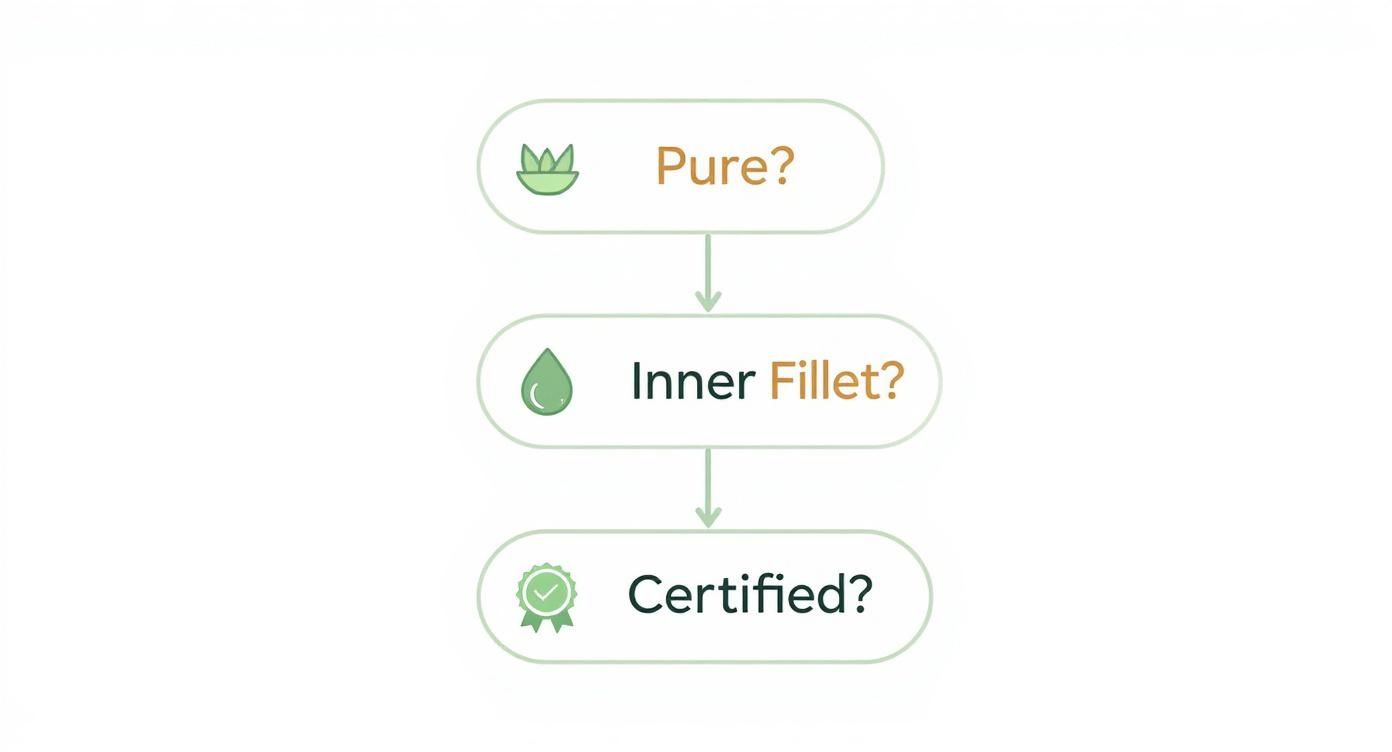
As the graphic shows, it really comes down to three pillars: purity, using the inner fillet, and trusted certifications.
When you're trying to calm your digestive system, the last thing you want is a juice loaded with junk. Purity isn't just a buzzword; it’s essential. That means you need to scan the ingredient list for a few red flags.
First off, avoid added sugars. Lots of brands add sugar, high-fructose corn syrup, or artificial sweeteners to make their juice taste better. These can actually work against you by throwing your digestive system off balance. A truly pure juice will have its own natural taste—clean, a little tangy, and maybe slightly bitter.
Also, keep an eye out for artificial fillers, colors, or flavors. These additives do nothing for your health and can sometimes even cause irritation. The best aloe juices have a short, simple ingredient list with organic aloe vera as the main event.
How the juice is processed is just as crucial as what part of the plant is used. The delicate compounds in aloe don't do well with heat. High-heat pasteurization, for instance, can destroy the very nutrients you're trying to get. Look for brands that mention minimal, low-heat processing methods that are designed to preserve the plant’s natural goodness.
This is where having control over the whole process, from farm to bottle, is a huge plus. Companies that own their farms and facilities can harvest and process their aloe within hours, locking in peak freshness and potency.
Finally, look for certifications you can trust right on the label. These seals are third-party proof that a product meets high standards for quality and purity.
USDA Organic: This seal guarantees the aloe was grown without any synthetic pesticides, herbicides, or fertilizers. It’s your best bet for a clean, natural product from the ground up.
Other Quality Seals: Certifications from groups like the International Aloe Science Council (IASC) also signal that a product has met specific purity and content standards.
By keeping these factors in mind—inner fillet, purity, gentle processing, and certifications—you’ll be able to confidently choose a product that genuinely helps you on your path to digestive comfort.
When you're looking for an aloe vera juice to support your digestive health, the story behind the bottle matters just as much as what’s on the ingredient list. The journey from a plant in the ground to a juice on the shelf involves dozens of crucial steps. Any misstep along the way can rob the final product of its purity and potency. This is where controlling every part of the process becomes a real game-changer.
At AloeCure, we believe that to make a truly superior product, you have to be involved from the very beginning. That’s why we are fully vertically integrated. We don’t just buy aloe from a supplier; we own and operate our own USDA Organic certified farms.
This farm-to-bottle control isn’t just a talking point—it’s our promise of quality. It lets us manage every detail meticulously, ensuring our aloe is grown to the highest possible standards and harvested right at its peak.
Our commitment starts right in the soil of our organic farms. By cultivating our own aloe, we can guarantee that no synthetic pesticides or fertilizers ever come near our plants. This dedication to organic farming gives us a cleaner, purer raw material from the start.
We hand-harvest our aloe, selecting only mature, nutrient-rich leaves. Because our processing facilities are located right on our farms, we can move our aloe from the field to production within just 12 hours of harvest. This rapid timeline is critical for locking in the delicate, naturally occurring compounds that give aloe its unique properties.
By minimizing the time between harvest and processing, we preserve the aloe's peak bioactivity, ensuring the juice in your bottle is as fresh and potent as possible. This is a level of quality control that simply can't be matched by companies that source their aloe from third-party growers.
Once harvested, how the aloe is processed becomes the single most important factor in creating a quality juice. Many large-scale producers use harsh techniques to speed up production and cut costs, but these common shortcuts can strip the aloe of its beneficial components.
Chemicals and Enzymes: Some companies use chemicals or enzymes to break down the aloe leaf, which can alter its natural composition.
Charcoal Filtration: This is often used to remove aloin, but it can also filter out valuable polysaccharides and other nutrients.
High-Heat Pasteurization: Excessive heat can destroy the delicate vitamins, enzymes, and other compounds that make aloe so beneficial.
AloeCure takes a different path. We developed a proprietary, patented, and entirely natural processing method that avoids these damaging shortcuts. We never use chemicals, charcoal filtration, or added enzymes. Our gentle, low-heat method is designed to do one thing: preserve the maximum potency and purity of the aloe’s inner fillet gel.
This careful approach ensures that every bottle of AloeCure juice delivers the clean, plant-based power you expect. It's how we can confidently offer a product designed to support your digestive health without compromise.
Our complete farm-to-bottle control is what we call the AloeCure Advantage. It’s the reason we can guarantee a level of purity, efficacy, and transparency that few others can claim. From the organic soil our aloe grows in to the proprietary process that protects its natural goodness, every step is managed with your wellness in mind.
This hands-on approach builds a foundation of trust. When you choose AloeCure, you’re not just buying aloe vera juice; you’re choosing a product born from a deep commitment to quality that you can feel. You can even sign up for our Subscribe & Save program to get 20% off and have this premium quality delivered right to your door.
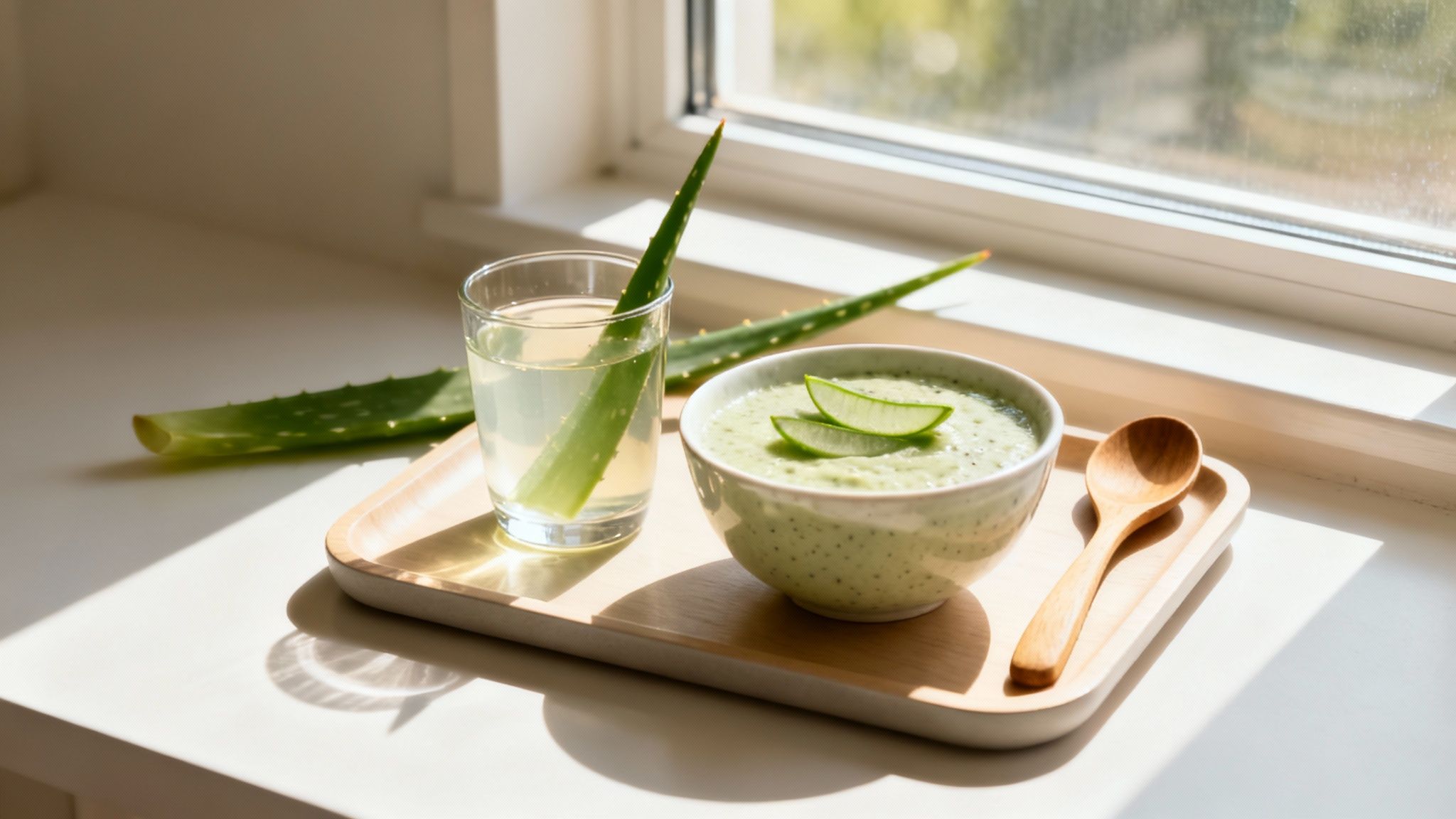
Successfully adding anything new to your wellness regimen really boils down to one thing: consistency. For aloe vera juice to truly support your digestive goals, it can't be an occasional habit. It needs to become a seamless part of your day—something that feels effortless, not like a chore.
The trick is to find a rhythm that works for both your body and your schedule. This isn't about making drastic changes overnight. It's about small, thoughtful adjustments that, over time, create a sustainable habit that supports digestive comfort and your overall well-being.
One of the first questions people ask is, "When's the best time to drink it?" Many find that taking a serving about 20 minutes before a meal works wonders. Think of it as priming your digestive system. This timing lets the soothing properties of the aloe create a more comfortable runway for the food to come.
When you're just starting, it's always a good idea to begin with a smaller serving. Pay attention to your body. This mindful approach helps you see how your system responds so you can adjust as you go. Starting slow is the key to finding that sweet spot that's just right for you.
For a deeper dive, our guide on recommended aloe vera juice dosages offers more specific insights to get you started on the right foot.
Let's face it: a new habit is much more likely to stick if you actually enjoy it. While plenty of people like the clean, crisp taste of pure aloe vera juice by itself, others prefer to mix things up a bit. Here are a few easy ideas to weave it into your daily life.
Blend It Into a Smoothie: This is an easy one. Just add your serving of aloe vera juice right into your morning smoothie. It goes great with low-acid fruits like bananas and melons, and it blends seamlessly with leafy greens like spinach for a nutrient-packed start.
Mix It with Water or Coconut Water: For a simple and hydrating boost, just dilute your aloe vera juice in a glass of still water or coconut water. It's a fantastic way to get the benefits while staying hydrated throughout the day.
Create a Soothing Pre-Meal Drink: Try combining your aloe juice with a little bit of non-acidic juice, like pear or melon. It makes for a refreshing beverage to have before lunch or dinner.
At the end of the day, the goal is to find a method that you find pleasant and easy to repeat. Whether you drink it straight or mix it into something else, the consistency of your routine is what will ultimately support your long-term digestive wellness.
The scientific community is always exploring how aloe supports digestive health, and it's a complex picture. For instance, some research shows that while some individuals experienced noticeable improvement with aloe vera, the statistical differences compared to placebo groups were sometimes small. These varied outcomes just go to show that individual responses can differ widely, and they really underscore the importance of choosing a high-quality product as part of your broader wellness plan.
Ultimately, incorporating the best aloe vera juice for acid reflux support into your routine is a personal journey. By finding the right timing, starting mindfully, and making it an enjoyable part of your day, you can build a lasting habit that contributes positively to your digestive harmony.
When you start looking into a new supplement, it’s only natural to have a few questions. This is especially true when you're trying to find the best aloe vera juice for acid reflux support, where the quality of the product makes all the difference. Getting good answers helps you feel confident you're making the right choice.
We get a lot of the same questions from people just starting their journey with pure aloe vera juice. To help you out, we’ve gathered the most common ones right here, so you can make this incredible plant a seamless part of your digestive wellness strategy.
This is probably the number one question we hear, and the honest answer is: it really depends on the individual. Everyone's body is different. Your diet, your lifestyle, and your unique digestive makeup all influence how you’ll respond. Some people tell us they feel a calming effect almost immediately, especially if they drink it before a meal.
For others, the benefits build up more slowly. Consistency is the real secret here. Think of it less like a quick fix and more like building a healthy habit, the same way you’d commit to a balanced diet or drinking enough water. The best approach is to be patient, listen to your body, and make it a regular part of your daily routine.
Remember, aloe vera juice is a dietary supplement. Its job is to support your body's own natural processes, working with your system to encourage a balanced internal environment over time. These statements have not been evaluated by the Food and Drug Administration. This product is not intended to diagnose, treat, cure, or prevent any disease.
If you’re expecting something like a sugary fruit drink, the taste of authentic, high-quality aloe vera juice might be a bit of a surprise. It shouldn't be sweet at all. A slightly bitter or tangy flavor is actually a great sign—it tells you the juice is pure and hasn't been loaded with added sugars or artificial flavors that can get in the way of its benefits.
Truly pure inner fillet aloe vera juice has a clean, crisp, and almost "green" taste. Many people say it's similar to unsweetened coconut water but with a more earthy, robust character. If you try an aloe juice that’s overly sweet, take a look at the label. You’ll likely find added sugars or other ingredients you don’t need. At AloeCure, we get a lot of compliments on our juice's clean taste, which comes directly from our farm-to-bottle commitment to purity.
It’s always a good idea to chat with your healthcare provider before adding any new supplement to your routine. This is particularly important if you’re taking prescription medications. While pure aloe vera juice is generally very well-tolerated, your doctor knows your full health history and can give you the best personalized advice.
To make that conversation easier, bring the bottle or a picture of the ingredient list to your appointment. Being open with your healthcare team helps ensure everything in your wellness plan works together safely and effectively.
Life happens, and sometimes you might forget to take your supplements. If you miss a serving of aloe vera juice, don't worry about it. There’s no need to double up on the next one. Just get back on track with your normal schedule.
Consistency over the long haul is far more important than being perfect every single day. The goal is to build a sustainable habit that supports your digestive system. Missing a serving every now and then won't set you back. Just pick it back up as planned to keep that steady support going.
Yes, a high-quality, purified inner fillet aloe vera juice that has had the aloin removed is generally considered safe for daily, long-term use. The most important factor is choosing a brand you can trust—one that is transparent about its purity and processing.
At AloeCure, we handle everything from the ground up. We own our organic farms and use our own proprietary processing methods to make sure our juice is pure, potent, and completely free from the harsh latex compounds found in the outer leaf. This hands-on approach is what makes our aloe vera juice a fantastic choice for daily, long-term digestive support.
Ready to experience the AloeCure difference? Our USDA Organic Pure Aloe Vera Juice is crafted with complete farm-to-bottle control to deliver the purity and potency your wellness routine deserves. Visit AloeCure.com to shop now or sign up for 20% off with our Subscribe & Save program!
Article created using Outrank
Comments will be approved before showing up.
16 min read
13 min read
Discover our guide to diet, lifestyle habits, and botanicals that support comfortable and balanced digestion.
14 min read
Instantly get a coupon and enroll for newest wellness trends

